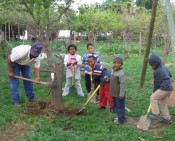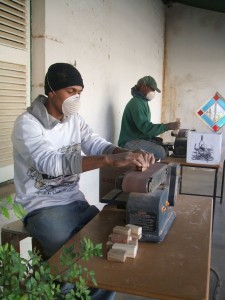Waldorf News
“Here Is the New South Africa” – The McGregor Waldorf School

ONCE UPON A TIME…
A water bearer in China had two large pots; each hung on the ends of a pole which he carried across his neck. One of the pots had a crack in it. The other pot was perfect and always delivered a full portion of water. At the end of the long walk from the stream to the house, the cracked pot arrived only half full. For a full two years this went on daily, with the bearer carrying only one and a half pots of water to his house.
Of course, the perfect pot was proud of its accomplishments, but the poor cracked pot was ashamed of its imperfection, and miserable that it was able to accomplish only half of what it had been made to do. After two years of what it perceived to be bitter failure, the cracked pot spoke to the water bearer.
“I am ashamed of myself, because this crack in my side causes water to leak out all the way back to your house.”
The bearer said to the pot, “Did you notice that there are flowers on your side of the path, but not on the other pot’s side? That is because I have always known about your flaw, so I planted flower seeds on your side of the path. And every day while we walk back, you water them. For two years I have been able to pick beautiful flowers to decorate the table. Without you being just the way you are, there would not be this beauty to grace the house.”
“Storytelling is one way in which people find meaning about who they are and where they come from. Stories carry within them wisdom and knowledge,’ says Nomsa Mdlalose, a South African storyteller. “In the past our ancestors used to tell us stories that molded us to be respectful and responsible people. The stories were not just for purposes of entertainment, but also to help guide and teach us good social and moral values.”

A well-told story is deeply satisfying as it resonates with that part of us where our truest self lives. Our soul drinks in the story and thereby brings healing to our wounds and wings to our dreams.
With the impact of globalization, western civilization has become aware of its roots through exposure to cultures that have remained true to more natural rhythms. The art of storytelling is being revived: there are digital story gathering sites; stories are used in the workplace to make people and organizations more aware of their stories and then to facilitate them in creating more interesting, useful, empowering and rewarding stories; stories are used as medicine for healing physical and psychological scars; medical students are taught to appreciate the value of listening to stories told by their patients; there is an international day of Telling Life Stories.

The story of the water bearer gives a picture of what the McGregor Waldorf School and College are all about. Flaws come in many different seizes and shapes but as teachers we learn to recognize them in our children and in ourselves. We plant seeds every single day and water them carefully so that one day the inner beauty, the innate qualities, the specific gifts of any and all of our students can flower. Because of them being the way they are and will be their families, their communities, their country and the world are and will be a better place.
Every community has a memory of itself. Not a history, nor an archive, nor an authoritative record…A living memory, an awareness of a collective identity woven of a thousand stories.
McGregor, a small South African town, has been home to a Waldorf school since 1994. Alongside the traditional South African graduation requirements, the school also offers further training possibilities for students who are strong in a practical area. So far, a bookbindery and a toy workshop have been established. In a place like McGregor, where unemployment is extremely high, the training facility offers new opportunities. The school serves about 150 children from various cultural and socio-economic backgrounds.
“The wonderful atmosphere and the love shining on the faces of the children as well as the teachers, enables me to say these words out of the depth of my heart: Here is the New South Africa. I wish and desire that the children of the Waldorf School could go everywhere in our beautiful country, so that adults and children could see how the New South Africa must be.” – Mayor of McGregor Town
It’s easy to understand how important this school is to the population living there. In the area around McGregor, the unemployment figure reaches up to 40%. For high school graduates with Matric (referring to the final year of high school and the qualification received on graduating from high school, it also refers to the minimum university entrance requirements), this figure even reaches up to 60-70%. Young people who have finished school without Matric are not even mentioned in this statistic. Many of the children at McGregor Waldorf School suffer from fetal alcohol syndrome, which can lead to extreme learning difficulties. Also, the physical, verbal and emotional violence that some students are exposed to every day does not create the best of learning conditions.
 This was the background for the founding of the McGregor Waldorf School. From the beginning the goal was to establish an educational center, which in the future would include small businesses and training possibilities. The first steps on this path give hope to the 1,800 residents of McGregor, not only because of the new work places and training possibilities, but also for the fact that the school is trying to overcome the heritage of Apartheid. At McGregor Waldorf School all children are being welcomed and learn how to build community, which does not judge differences but rather understands them as enriching.
This was the background for the founding of the McGregor Waldorf School. From the beginning the goal was to establish an educational center, which in the future would include small businesses and training possibilities. The first steps on this path give hope to the 1,800 residents of McGregor, not only because of the new work places and training possibilities, but also for the fact that the school is trying to overcome the heritage of Apartheid. At McGregor Waldorf School all children are being welcomed and learn how to build community, which does not judge differences but rather understands them as enriching.
Despite the fact that the financial situation of the school is unstable and relies a lot on foreign donations, the teachers continue to foster impulses which could eventually lead to financial independence. The small bookbindery, supplying South African Waldorf School’s with main lesson notebooks, is an example. With time other initiatives are being brought into being which are providing work places for the population as well as training possibilities and employment for students who are not able to finish twelfth grade and graduate.
 McGregor Waldorf School fosters a very lively and artistic cultural life. Art and drama are an important integrated part of daily school life. Everyone from the community of McGregor is always welcome to performances, events and festivals and the school stands as a role model for a successful attempt at integration.
McGregor Waldorf School fosters a very lively and artistic cultural life. Art and drama are an important integrated part of daily school life. Everyone from the community of McGregor is always welcome to performances, events and festivals and the school stands as a role model for a successful attempt at integration.
Visit the school’s website, which has contact details. For donations through the Friends of Waldorf Education, visit the McGregor Waldorf page here. This article was prepared from the McGregor Waldorf School news and from the Friends of Waldorf Education article. The first two photos are from Tanya Joubert and are from the school’s production of Romeo and Juliet. The remaining photos are from the Friends of Waldorf Education and the school.

Sponsors are individuals, families, classes and/or schools who contribute to the school fees of one particular child who is then acting as an ambassador for the whole school. This enables all children from disadvantaged families to receive Waldorf Education. More than 90% of McGregor Waldorf School families can only contribute a small amount towards the cost of educating their children.
60% of our students and 4 classes are sponsored by 148 people-groups from around the world.
If you wish to become a sponsor, e-mail Katleen, our sponsorship co-ordinator, at katleen@breede.co.za. You will receive the name, photograph and story of the child acting as an ambassador and information on the most cost-effective way of contributing.
The McGregor Waldorf School works with various organizations around the world (Freunde der Erziehungskunst – Germany; Internationaal Hulpfonds – The Netherlands; ACACIA – Switzerland, Solidariteit om Leven – Belgium; Centre for the Art of Living – USA; Stichting Projecten Zuid-Afrika –the Netherlands), which enable sponsors to use their contribution for tax deductions.
 Grade Level Training in Southern California
Grade Level Training in Southern California Roadmap to Literacy Books & Courses
Roadmap to Literacy Books & Courses Waldorf EC Training & Intensives in Canada
Waldorf EC Training & Intensives in Canada Summer Programs - Culminating Class Trips
Summer Programs - Culminating Class Trips Bringing Love to Learning for a Lifetime
Bringing Love to Learning for a Lifetime Everything a Teacher Needs
Everything a Teacher Needs Transforming Voices Worldwide
Transforming Voices Worldwide Waldorf-inspired Homeschool Curriculum
Waldorf-inspired Homeschool Curriculum Flexible preparation for your new grade
Flexible preparation for your new grade The Journey is Everything
The Journey is Everything ~ Ensoul Your World With Color ~
~ Ensoul Your World With Color ~ Association for a Healing Education
Association for a Healing Education Full-Time Teacher Education
Full-Time Teacher Education Caring for All Stages of Life
Caring for All Stages of Life Immersive Academics and Arts
Immersive Academics and Arts Storytelling Skills for Teachers
Storytelling Skills for Teachers The Art of Administration and Leadership
The Art of Administration and Leadership Train to Teach in Seattle
Train to Teach in Seattle Bay Area Teacher Training
Bay Area Teacher Training Art of Teaching Summer Courses 2025
Art of Teaching Summer Courses 2025 Apply Today: New Cohort Starts Nov. 2025
Apply Today: New Cohort Starts Nov. 2025 Dancing for All Ages
Dancing for All Ages Space speaks. Its language is movement.
Space speaks. Its language is movement. Jamie York Books, Resources, Workshops
Jamie York Books, Resources, Workshops Middle School Science With Roberto Trostli
Middle School Science With Roberto Trostli Quality Education in the Heartland
Quality Education in the Heartland RSS Feeds
RSS Feeds